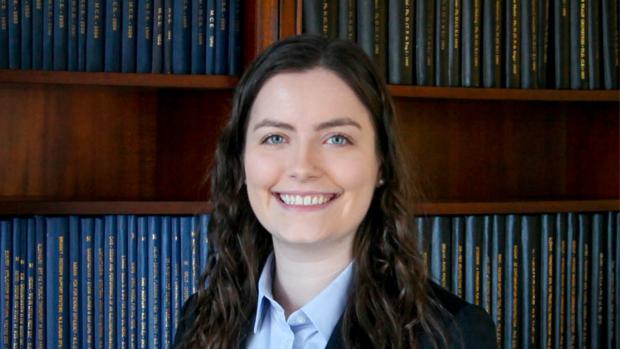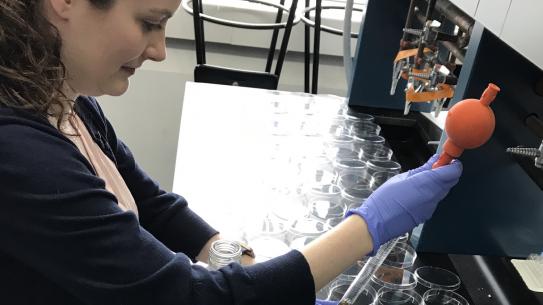Ph.D. Student Awarded National Science Foundation Fellowship
Research Focuses on One of the Biggest Threats to Global Health Today: Antibiotic Resistance

Fiona Dunn, Ph.D. student in the Department of Civil and Urban Engineering and recent recipient of the National Science Foundation Graduate Research Fellowship.
Fiona Dunn, a Ph.D. student in the Department of Civil and Urban Engineering, was awarded the National Science Foundation Graduate Research Fellowship for the research she is conducting with Assistant Professor Andrea Silverman on the sunlight inactivation of antibiotic resistant bacteria and antibiotic resistance genes in the water environment. “When antibiotic resistant bacteria travel to a wastewater treatment plant, the bacteria can be destroyed, but the genes that convey resistance can survive the treatment process and end up in the environment,” she explains. Her research on the sunlight inactivation of antibiotic resistant bacteria and antibiotic resistance genes focuses on the question of what happens once they enter the environment. Where do they go? Can they be inactivated?
The World Health Organization calls antibiotic resistance “one of the biggest threats to global health, food security, and development today." With the overuse of antibiotics, infection-causing bacteria have grown immune to some medicines, leading to greater medical costs, longer treatment plans, and a higher risk of serious illness or death. When someone is infected with an antibiotic resistant bacteria, those microorganisms end up in the sewer system and find their way to wastewater treatment facilities, where the water is often treated for bacteria — but where eliminating remaining antibiotic-resistant DNA is a slower, imperfect process.
As part of the research she is conducting with Silverman, Dunn intends to run experiments on how the antibiotic resistance genes might be inactivated in the environment. She measures the influence of one variable at a time and attempts to fit them into a model. “We do know that variables like the UV presence in sunlight do inactivate genes,” says Dunn. “There are a few other variables like temperature and water quality characteristics in the environment that might impact that inactivation as well. Understanding the fate of antibiotic resistant bacteria and their genes in the environment is essential in order to design control measures, predict health risks, inform surveillance, and prioritize policy interventions.”
Dunn’s interest in environmental engineering began when she attended a summer engineering awareness program for high school students. There, she did a water filtration lab, which piqued her interest not only in the science of water quality, but the broader social implications of providing clean water for a community. When she participated in an undergraduate volunteer trip to Port au Prince, Haiti, to study environmental engineering and water quality, her interest blossomed into a genuine passion. “I was able to see firsthand the impact of water-related issues in global communities,” says Dunn, “Water treatment and environmental engineering affect issues like public health, economic development, societal progress, and social justice.”

Dunn’s passion for projects focused on water quality led her to pursue the prestigious National Science Foundation Graduate Research Fellowship, an award supporting master's and doctoral students in science, technology, engineering, and mathematics. Fiona Dunn was selected as one of this year’s fellows, for her research into the fate of antibiotic resistance genes in the water environment. The fellowship program opens up networking opportunities with potential employers and research partners, as well as opportunities to work with international research institutes. Forty-two recipients of the NSF Graduate Research Fellowship have gone on to become Nobel laureates.
Dunn says her success as a student and her ambition as a researcher are due, in part, to the excellent female advisors who have guided her, including Dr. Jessica Wilson, who assisted her at the beginning of her research career at Manhattan College and encouraged her to pursue a Ph.D. She’s excited to now be mentored by Assistant Professor Silverman, who has joint appointments in Tandon’s Department of Civil and Urban Engineering and at the NYU College of Global Public Health, and who has gained recognition for her own work in researching sustainable and appropriate wastewater treatment processes to protect public health and the environment.
Annie Brinich
NYU Tandon School of Engineering
Master of Science in Integrated Digital Media, Class of 2019





